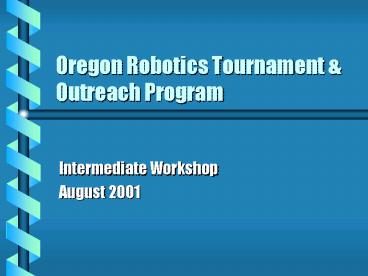Oregon Robotics Tournament - PowerPoint PPT Presentation
1 / 31
Title:
Oregon Robotics Tournament
Description:
Hard vs Soft Skills. Hard Skills. Mechanical Design. Programming ... Pressed vs release. Light Sensors. Light levels. Darker/lighter. Calibrating thresholds ... – PowerPoint PPT presentation
Number of Views:31
Avg rating:3.0/5.0
Title: Oregon Robotics Tournament
1
Oregon Robotics Tournament Outreach Program
- Intermediate Workshop
- August 2001
2
Hard vs Soft Skills
- Hard Skills
- Mechanical Design
- Programming
- Analysis
- Problem Solving
- Experimentation
- Documentation
- Soft Skills
- Timeliness
- Teamwork
- Tact
- Confidence
- Compromise
- Courtesy
- Perserverence
- Planning
3
Problem Solving
- Defining problem
- Brainstorming
- Evaluating alternatives
- Choosing alternative
- Implementing
- Evaluating testing
4
Advice from Minnesota
- Co-coach or otherwise pair up
- Keep a positive attitude
- Emphasize demonstrating a solution at the
tournament is success - Dont over emphasize winning
- Have fun
- Dont worry about the solution thats up to the
team
5
Mission
- Share the fun of technical problem solving
- Open up the possibility of technical careers
6
Commitment
- Risk Taking
- Experimentation
- Failure
- Problem solving takes time
7
Coaches
- Coach can be
- teacher
- club leader
- scout master
- parent
- Coach will determine when team meets, etc.
- Coach does not need to be techie
8
Possible Profiles
- School Based
- In class Perhaps 45 minutes a day
- After school Perhaps 1.5 hours 2 to 4 times a
week - Special block Several hours once a week
- Club Based
- Probably after school or evening
- Independent team
- After school, evenings, or weekends
9
Practice Venue
- Can start with a floor
- Later may want an official competition table
- perhaps shared with other teams
10
Team size
- May start with more interest than you expect to
continue - In a computer lab, many mini-teams of 2-3 can
- experiment with programming
- search the web for robotics information
- Identify core team to design and build robot
- Eventually team should stabilize at 10 or less
- 5 to 7 team members may be ideal
11
Minimum resources
- A kit
- A computer
- A place to meet and practice
- classroom
- family room
- garage
12
Kit Info
- Can start with
- LEGO Mindstorms Robotic Invention System at 200
or - LEGO Dacta Team Challenge (D979790) at 228 plus
Robolab software(W900050) at 38 - then upgrade in August with FLL Technology
Upgrade Kit (990632) at 80.00 - Or, order FLL Robotics Starter Kit (990633) at
260 for delivery in August. - Recommend purchase of
- Team Challenge Introductory Activity Pack
(L900055) at 25 and - Team Challenge Activity Pack (D909790) at 30
13
Kit Ordering
- Mindstorms kits available
- from LEGO at 800-453-4652
- FLL kits from FLL web site
- Everything else available from
- Small World Technologies, 503-640-1729 or
- PITSCO, 800-362-4308
- See FAQ for details
14
Coaches vs Mentors
- Coach Organize team
- Mentor Technical consultant
15
Coach
- Instill spirit in team
- Recruit team
- Schedule meetings
- Arrange for practice table or equivalent
- Register team
- Order kits, etc.
- Understand the rules
16
Coach
- Encourage teamwork
- Insist on mutual respect
- Facilitate development of timeline
- Deal with parents
- Philosophy, goals, rules
- Communicate about tournament
- Solicit help
- Communicate with school, etc.
- Have fun
17
Mentor
- Technical Advisor Let coach do his/her job
- Understand both
- robot design
- programming
- Encourage structured problem solving
- experiment with one variable at a time
- set achievable goals
- Remember team members are kids
- limit terminology
- have fun
18
Mentor
- Pick one or two new subjects per session
- Loops
- Sensors
- Gears
- Pulleys
- Tracks
- Wheels
- Meet with coach regularly
- Dont solve problems for team
- Focus on questions not answers
19
Coaches -- Things to think about
- Refreshments
- Parents responsibilities
- Team sponsor
- Team shirts
20
Divide and conquer
- Locomotion
- Navigation
- Robotic Action
21
Locomotion
- Motors
- Gears/pulleys
- Wheels/tracks
- Steering
- Encourage simple experiments
22
Navigation
- Touch Sensors
- Means of triggering
- Pressed vs release
- Light Sensors
- Light levels
- Darker/lighter
- Calibrating thresholds
- Encourage simple experiments
23
Robotic Action
- Pushing
- Grabbing
- Lifting
24
Sources of ideas
- Constructopedias
- Web including
- Lego http//mindstorms.lego.com/
- Tufts University http//www.ceeo.tufts.edu/curric
ulum/ - Real world
25
Kick-off Meeting
- Both team parents and team members
- Background
- Philosophy
- Format
- Goals
- Responsibilities
26
Second Meeting
- Kids only
- Discuss teamwork
- Pros
- Cons
- Discuss existing skills
- Assign kids to learning tasks
- Multimedia
- Build something from Constructopedia
- Discuss challenge in simple terms
27
Third Meeting
- Simple robots
- Acrobot
- Simple programming
- Pilot 1, 2, 3
- Discuss challenge
28
Fourth Meeting
- Robot with gears or pulleys
- Pilot 3 4
29
Fifth Meeting
- Introduce practice challenge
- Can-Do challenge or equivalent
- Pilot 4
30
Sixth Meeting
- More on challenge
- Inventor 1 or 2
31
Seventh Meeting
- Finish practice challenge
- Discuss how practice challenge could be made more
difficult - Discuss 2001 FLL Challenge
- Discuss possible divide conquer






























